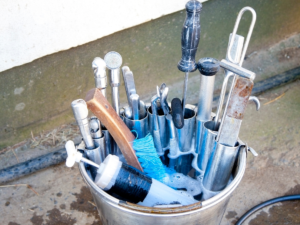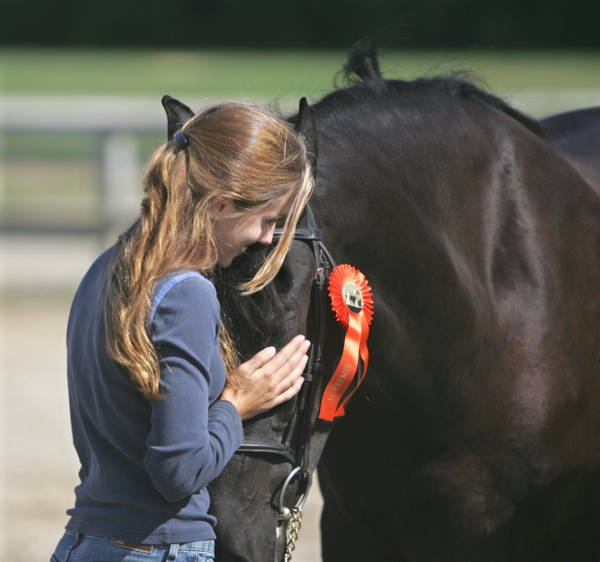Just like people, horses need routine dental care to stay healthy. Dental care and oral health is essential to keep your horse healthy because, unlike humans, their teeth can grow and change shape throughout their life. Scheduling regular dentals will help keep teeth the correct length and shape and prevent dental-related health issues.
What Exactly is a Dental?
A dental examination should be scheduled with a certified equine dentist or veterinarian that specializes in routine dental work. There are many equine dentists out there without certification providing dental care. While some of these folks are excellent dentists, please be cautious when trying an uncertified dental provider or dental service. They can cause significant damage to your horse’s mouth. You always want quality care for your horse when it comes to any treatment. If you are unsure or trying a new dentist, always ask for customer testimonials prior to your appointment.
While this appointment may just be a checkup of the teeth, equine dentists will often rasp sharp edges of teeth in a technique called “floating”. Many dentists will also remove baby teeth, also known as deciduous caps, as well as fractured or infected teeth.
During a dental exam, the dentist will ask a series of questions about relevant health history. Then, they will perform a comprehensive exam of the mouth including gums, teeth, and tongue. After the exam is complete and any problems are identified, the dentist will proceed with a dental float. Floating includes rasping down sharp edges and correcting any uneven bite planes. Dentists will look for fractured, broken, or infected teeth as well. Depending on the severity and situation, these may need to be removed.
Some equine dentists can perform all of these tasks with manual tools, while others are qualified to use motorized dental equipment. When dentists use motorized tools, the horse will often need to be sedated.

Common Manual Dental Tools
Why Do Horses Need Dentals?
Horses grind their molars in a sideways motion to crush their food. This grinding motion will wear down the teeth over time, but can sometimes result in sharp edges and hooks if the grinding is uneven. In addition, the domestication of the horse changed their traditional forage and grazing patterns which means they now need our assistance. If sharp edges develop on a tooth, it will rub and cut the cheeks and tongue and lead to discomfort and pain. These issues are further magnified during riding because of bit pressure and will require dental treatment.
Want to learn more about Horse Care? Check out our other Horse Care articles!
Common Dental Problems
Horses can suffer from a variety of dental problems throughout their lives. Here are some of the more common problems:
- Sharp points/edges on cheek teeth
- Hooks that form on the upper and lower cheek teeth
- Infected teeth and/or gums
- Tooth decay
- Retained caps (baby teeth that don’t shed)
- Lost or broken teeth
- Uneven alignment of bite planes
In many cases, you can recognize a dental problem without even looking in the mouth because horses give obvious signs of pain and irritation in their behavior and eating habits.
If your horse has difficulty chewing or loses a lot of feed from his mouth while chewing (quidding), that’s a good indication of a dental problem. Horses with infected teeth or gums will often have a foul odor or “bad breath” coming from their mouth or nostrils. If your horse has lost overall body condition or stopped eating, you should evaluate their dental health immediately.
Even the most well-trained horse will exhibit behavioral issues when they are suffering from teeth-related issues. You may witness head tilting or tossing, not turning or stopping, and even bucking. If your horse displays any of these behaviors seemingly out of the blue, it’s time to call the dentist.
Need to keep track of your horse records and hate using apps? Try our Free Horse Record Tracker!
Regular Dental Care Recommendations & Benefits
To keep your horse’s mouth healthy, it’s best to keep up with regular exams. At the very minimum, your horse should be examined once a year. However, there are many variables to consider, such as the horse’s age, breed, history, and performance. In our experience, older horses tend to need more frequent dental examinations.
Many equine dentists recommend a checkup as often as once every 6 months.

I’ve been around horses my entire life, but my Friesian journey started just over 20 years ago. Our horses have always been a part of our family. They have traveled with us as we relocated from Vermont to New York to Iowa and finally, to Arizona. I can’t wait to share our story with you!
Related
Feb 20, 2022
Why Dentals are So Important: The Enormous Impact Dental Care has on Your Horse’s Health

Leave a Reply Cancel reply
@starlitridgefriesiansandfells
LET'S BE FRIENDS ON INSTAGRAM